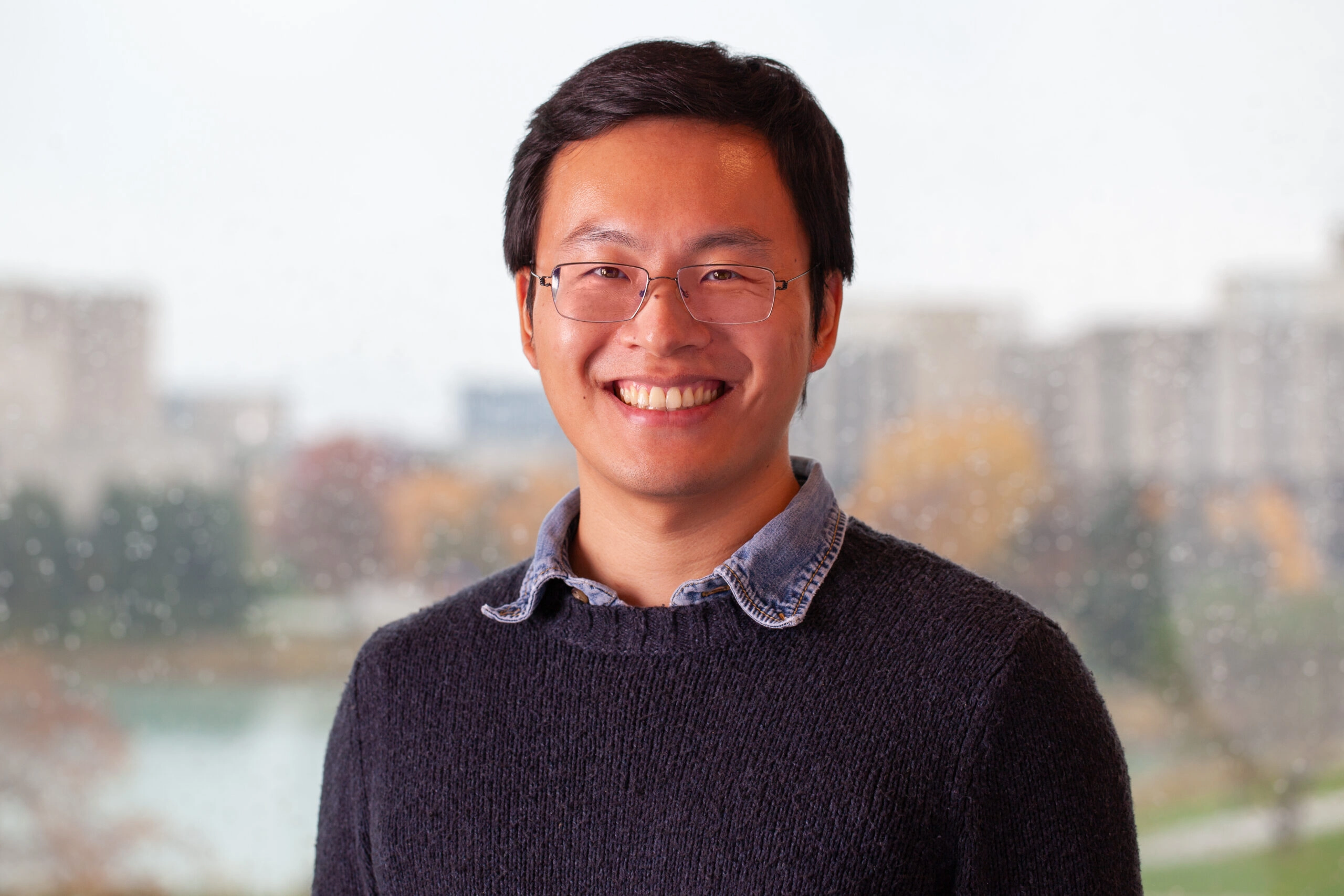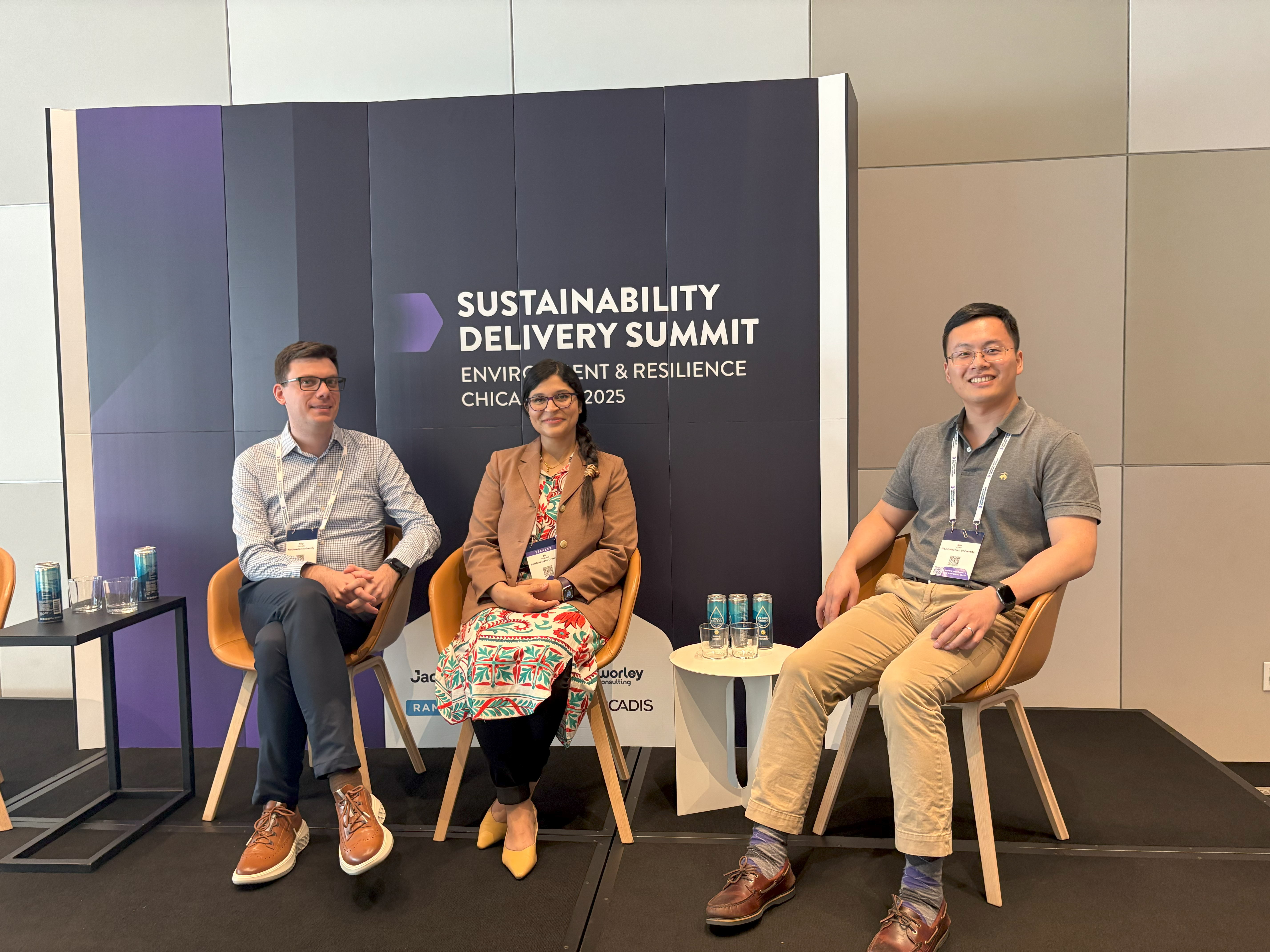Q&A with Dr. Bin Chen: Advancing Research and Collaboration
Bin Chen has played a central role in shaping the Trienens Institute's research strategy, serving as research faculty for the Generate pillar, one of the Trienens Institute R&D Pillars, and chairing the Trienens Research Implementation Committee. In these roles, he has helped foster collaboration across pillars, strengthened faculty partnerships, and advanced efforts to increase external research funding.
 Since August 1, Chen has served as Director of Research at the Trienens Institute. This promotion reflects his leadership in coordinating research efforts and his vision for expanding partnerships, both across academia and with industry. Working closely with Executive Director for Industry Partnerships Lee Zachos, Chen will ensure that Trienens' research priorities are aligned with federal funding opportunities, industry collaborations, and the Institute's broader mission of driving innovation in sustainability and energy.
Since August 1, Chen has served as Director of Research at the Trienens Institute. This promotion reflects his leadership in coordinating research efforts and his vision for expanding partnerships, both across academia and with industry. Working closely with Executive Director for Industry Partnerships Lee Zachos, Chen will ensure that Trienens' research priorities are aligned with federal funding opportunities, industry collaborations, and the Institute's broader mission of driving innovation in sustainability and energy.
In this Q&A, Chen shares his perspective on sustainability research, his goals for strengthening collaboration at Northwestern, and what excites him most about the future of the Institute.
Why does research and sustainability matter to you personally? What experiences or influences have shaped your approach to sustainability?
From an early age, I was fascinated by how essential resources like energy shape people’s lives and opportunities. I often imagined a world where clean, abundant energy was available to everyone. That idea inspired me to pursue sustainability research, because I believe these technologies don’t just solve scientific challenges; they also create the foundation for a more peaceful, equitable, and secure future.
What have you learned from serving as chair of the Research Implementation Committee? What has been the most rewarding aspect of your work at Northwestern so far?
Serving as chair of the Trienens Research Implementation Committee has been an incredibly rewarding experience because it allows me to collaborate with some of the world's leading researchers—people who are not only advancing their fields but also deeply committed to sustainability and the future of our planet. I’ve learned that when you bring talented people together, identify opportunities, and create the right environment for collaboration, transformative research emerges.
Our committee’s role is to translate the vision set by the Trienens Research Implementation Committee into practice, coordinating across pillars, aligning operations, and building partnerships. The most fulfilling part has been seeing these collaborations take root. Through initiatives like our seed grant program and industry roundtables, faculty have launched high-risk, high-reward projects that have grown into strong joint proposals. It has also been exciting to engage with industry partners, listen to their sustainability challenges, and connect them with faculty teams to co-develop solutions. For me, the greatest reward is helping to build a collaborative ecosystem at Northwestern that is poised to shape the future of sustainability research.
What are your primary responsibilities as Director of Research and how do they build on your work with the Research Implementation Committee and the generate pillar?

As Director of Research, my role is to build the ecosystem that allows our research pillars to succeed. I create the structures, partnerships, and community support that enables the Trienens Institute faculty to focus on what they do best; leading bold, field-defining research.
My experience co-leading the Generate pillar, along with Professors Mercouri Kanatzidis and Dayne Swearer, taught me how to set research priorities, spark collaborations, and sustain momentum. That perspective carried into my role as chair of the Research Implementation Committee, where I helped translate our research vision into action by coordinating across pillars and engaging industry partners.
Now I draw on both experiences to strengthen collaboration and position the Trienens Institute to deliver sustainability research with global impact.
You will be working closely with Lee Zachos, our new Executive Director for Industry Partnerships. How do you envision research faculty and industry partners collaborating more effectively in the years ahead?
I’m very excited to collaborate with Lee Zachos in elevating how our research faculty and industry partners work together. Lee brings a remarkable background from Argonne, where he built strong connections across government, industry, and science, and he has a deep understanding of both the federal and corporate landscapes. With his expertise, I see faculty working more directly with his team to co-design research agendas, shape sponsored projects that address real challenges, and strengthen the impact of our outreach.
One path forward is to expand our industry roundtables and affiliation program under shared leadership by which I mean working with Lee and Trienens faculty to identify pressing themes and convene researchers and R&D leaders to define where science needs to go next. Lee's team can also help align faculty expertise with company roadmaps and guide proposals from early ideas through execution. Over time, we may even see industry partners playing a role in shaping seed funding calls or serving on review panels, deepening both their stake and alignment with our work.
I also anticipate our internal processes becoming more seamless and coordinated. By streamlining outreach between faculty, Trienens staff, and Corporate Engagement, we can ensure that promising opportunities with industry partners don’t get lost in silos, but instead evolve into high-impact collaborations.
From your perspective, how do Northwestern's research strengths position us to address global sustainability and energy challenges?
Northwestern combines world-class expertise in materials and energy, advanced computation and data science, and policy, economics, and social sciences. Our R&D Pillars, led by domain experts in areas such as energy generation, storage, deployment, transformation, and capture, provide both depth and connectivity, allowing strengths in one area to amplify progress in another.
Another unique strength is our convening power. Northwestern doesn’t just advance research; we bring academic leaders and industry innovators into the same room. Through our Industry Affiliates Program and targeted roundtables, faculty collaborate directly with companies to define pressing challenges and co-design next-generation technologies. Recent roundtables have focused on AI and data centers as well as solar energy, with upcoming sessions on storage and carbon capture. These interactions connect real-world needs with cutting-edge science, giving Northwestern the ability to shape technology roadmaps, drive innovation, and deliver sustainability solutions that extend from the lab to society.
Looking ahead, what are your priorities for advancing research coordination across the Trienens Institute pillars?
Looking ahead, my priority is to strengthen the bridges across our pillars so that the Institute’s research is not only excellent within each domain but also greater than the sum of its parts. I see three main areas of focus.
First, expanding cross-pillar collaborations. We’ve seen how seed grants and industry roundtables can spark valuable connections, and my goal is to make those mechanisms more routine so that collaboration becomes a defining feature of how we operate.
Second, tackling real-world challenges with a unified front. By working more closely with industry and external partners, we can ensure our research speaks directly to urgent sustainability needs. Coordinated efforts across the pillars allow us to offer integrated solutions that match the scale of the problems we face.
Third, strengthening infrastructure and support systems. Faculty bring bold ideas, and with the right coordination, operational tools, and community backing, they can maximize their impact. I want Trienens Research Implementation Committee to continue evolving as a hub that helps identify opportunities, respond swiftly to funding landscapes, and amplify the reach of our work.
Ultimately, my goal is to position the Trienens Institute as the place where cross-disciplinary research, industry engagement, and academic leadership come together to deliver sustainability solutions with global impact.
What excites you most about the future of the Trienens Institute?
What excites me most is the momentum we’re building and the possibilities ahead. With world-class faculty leading our pillars, a strong culture of collaboration, and a proven ability to convene industry and academic leaders, we already have a powerful foundation to tackle urgent sustainability challenges.
Looking forward, I’m energized by the opportunity to translate that strength into impact at scale, where the ideas generated here shape not only science, but also technologies, policies, and roadmaps that touch people’s daily lives. Trienens is uniquely positioned to do this by combining academic leadership, cross-pillar collaboration, and deep engagement with industry and government partners.
On a personal level, I’m inspired every day by the chance to work alongside colleagues who care deeply about the planet and its future. Being part of building something that can truly change the trajectory of energy and sustainability is both humbling and exhilarating, and that’s what excites me most about where we’re headed.
Chen’s collaborative approach continues to shape the Institute’s research direction and partnerships. To learn more about Dr. Chen's work as Director of Research at the Trienens Institute, visit https://trienens-institute.northwestern.edu/research/